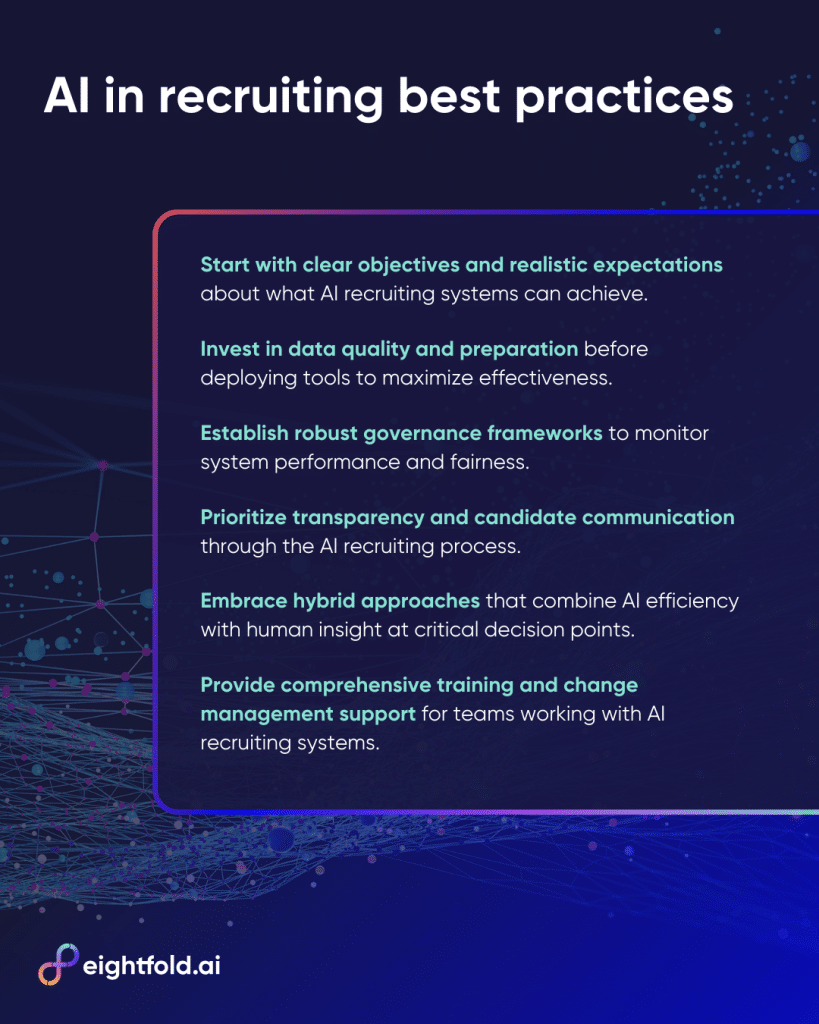- AI in recruiting isn’t just about automation — it’s about building fairer, smarter, and more people-focused hiring systems that improve candidate experience and employer brand.
- The biggest wins come when you pair AI with strategy: strong data foundations, bias monitoring, and transparent communication drive sustainable success.
- If you embrace AI in recruiting today, you’re positioning your organization as a future-focused talent leader, gaining efficiency, compliance strength, and a lasting competitive edge.
The recruitment landscape has undergone an exciting transformation in recent years, with AI in recruiting emerging as a revolutionary solution that’s reshaping how organizations connect with top talent worldwide.
While artificial intelligence offers tremendous opportunities to streamline hiring processes, reduce bias, and improve candidate matching, implementing AI in recruiting successfully requires strategic planning and thoughtful execution.
As forward-thinking organizations embrace AI-powered recruiting tools, HR and business leaders are discovering valuable insights about implementation best practices. Understanding these key considerations will empower you to maximize the benefits of AI while building robust, effective hiring systems.
Learn how NTT DATA enhanced its recruitment process with AI.
Challenge 1: Improving data quality and availability
One of the most important foundations for successful use of AI in recruiting is establishing high-quality data practices. Since AI systems learn from training data, this presents an excellent opportunity to clean up and enhance historical hiring information.
When implementing AI in recruiting solutions, it’s common to discover opportunities to improve data management. Hiring records can be standardized, gaps can be filled, and outdated information can be refreshed to better reflect current role requirements.
This process also provides a valuable chance to identify and address any unconscious bias that may have influenced past hiring decisions, ensuring AI systems promote more equitable outcomes.
While you need to invest time and resources in data preparation before deploying AI in recruiting tools, this upfront investment pays dividends through more accurate, fair, and effective hiring decisions. The ongoing data quality maintenance becomes easier over time as you establish better data collection practices.
Challenge 2: Enhancing fairness through bias monitoring
AI for HR represents a powerful opportunity to create more equitable hiring processes when implemented with proper oversight. While AI systems can inherit biases from training data, this challenge has sparked innovative approaches to bias detection and mitigation that benefit the entire recruitment industry.
Organizations are developing sophisticated methods to identify subtle biases that might emerge from data points like university names, previous company affiliations, or résumé language patterns. This heightened awareness is leading to fairer hiring practices across the board.
Those implementing AI in recruiting are becoming leaders in establishing comprehensive bias monitoring and mitigation strategies. These include regular auditing of AI decision-making processes, diverse testing scenarios, and continuous validation to ensure equitable outcomes across all candidate groups.
Agentic AI is reshaping the future of recruiting with its autonomous abilities to act, adapt, and make decisions.
Challenge 3: Navigating legal and compliance opportunities
The evolving regulatory landscape around AI in recruiting creates opportunities for you to establish your organization as an industry leader in responsible AI implementation. As requirements for transparency, explainability, and fairness in automated hiring decisions develop, you can gain competitive advantages.
Recent legislation in cities like New York and states like Illinois has provided clear guidance for AI in recruiting tools, including bias audit requirements and candidate notification standards. Organizations that embrace these requirements often find improvements in overall hiring quality and candidate experience.
The dynamic nature of AI in recruiting regulations encourages organizations to build flexible, adaptive systems. This forward-thinking approach positions you to quickly adopt best practices and maintain your competitive edge as the industry evolves.
Challenge 4: Enhancing candidate experience through thoughtful design
Implementing AI for recruitment can improve the candidate experience while increasing efficiency. Forward-thinking organizations are discovering how to blend automated processing speed with personalized, engaging candidate interactions.
The growing emphasis on transparency in AI recruiting is driving innovation in candidate communication. Organizations are developing creative ways to explain hiring processes in accessible terms, building trust and strengthening employer brand.
You should be successfully balancing AI efficiency gains with exceptional candidate experiences through innovative hybrid approaches. These combine the speed and consistency of AI with meaningful human touchpoints at crucial stages of the recruitment process.
Bianca Choudhary of AstraZeneca talks about how the importance of delivering quality care to patients has helped better their talent acquisition strategies using AI.
Challenge 5: Modernizing systems through strategic integration
Technical integration presents an excellent opportunity to modernize your entire HR tech stack. Many organizations use AI implementation as a catalyst to upgrade and streamline applicant tracking systems, HR information systems, and other recruitment technologies.
Rather than creating obstacles, thoughtful integration planning can help you reduce data silos, improve workflows, and increase overall efficiency — exactly what AI in recruiting is designed to achieve.
The integration process encourages you to invest in system improvements that benefit your entire HR operation. This holistic approach to tech modernization creates lasting value beyond the AI recruiting implementation.
Process integration naturally leads to workflow optimization, staff development, and procedure refinement that makes your organization more agile and effective in its talent acquisition efforts.
Challenge 6: Building skills and embracing change
Successfully implementing AI in talent acquisition also creates opportunities for you and your HR team to develop new, in-demand skills. Understanding AI capabilities, interpreting system outputs, and managing AI-driven processes positions you at the forefront of recruitment innovation, and can often strengthen partnerships between your HR team and IT.
Change management becomes a growth opportunity in AI recruiting implementations. Rather than replacing human expertise, AI empowers your recruiting team to focus on higher-value activities like relationship building, strategic thinking, and complex decision-making.
The continuous evolution of AI recruiting technology ensures that your teams stay current with industry innovations. This ongoing learning culture helps you attract top talent, workers who want to grow with advanced, progressive organizations.
Challenge 7: Boosting ROI through strategic measurements
While AI delivers impressive cost savings for talent acquisition over time, organizations are discovering that initial investments yield benefits beyond traditional metrics. Smart HR leaders are finding creative ways to measure and demonstrate the full value of AI recruiting systems.
Measuring return on investment for AI in recruiting implementations encourages the development of more comprehensive success metrics. This holistic approach to measurement often reveals unexpected benefits and justifies continued innovation in talent acquisition.
Forward-thinking organizations are developing sophisticated frameworks to quantify benefits like improved candidate quality, reduced bias, and enhanced employer branding. This data-driven approach secures stakeholder buy-in and supports continued investment in AI-related talent acquisition initiatives.
Solutions and best practices for AI in recruiting
Several organizations are achieving remarkable success with AI in recruiting by following these proven strategies:
- Start with clear objectives and realistic expectations about what AI recruiting systems can achieve. This foundation ensures sustainable, long-term success.
- Invest in data quality and preparation before deploying AI technologies to ensure system effectiveness and efficiency from day one.
- Establish robust governance frameworks to monitor system performance and fairness, creating transparency and accountability.
- Prioritize transparency and candidate communication throughout the AI recruiting process to build trust and enhance your employer brand.
- Embrace hybrid approaches that combine AI efficiency with human insight at critical decision points.
- Provide comprehensive training and change management support for your teams working with AI in recruiting, turning implementation into a growth opportunity.
The bright future of AI in recruiting
The use of AI in recruiting presents far more opportunities that outweigh implementation considerations. If you approach AI recruiting strategically, with thorough planning and commitment to best practices, you’ll consistently achieve substantial benefits while building stronger, more effective hiring processes.
As AI recruiting technology advances and regulatory frameworks mature, implementation will become increasingly straightforward. The lessons learned by early adopters are paving the way for even greater success as AI systems become more sophisticated and user-friendly.
Success with AI in recruiting will reward your organization with improvements in efficiency, fairness, and candidate quality. If you also embrace continuous learning and maintain focus on transparency and candidate experience, you’ll be better positioned to benefit from AI’s potential.
The journey toward effective AI in recruiting is a smart investment in your future. If you navigate this evolution successfully, your organization will gain a significant competitive advantage in attracting and hiring top talent, positioning you as an employer of choice in an increasingly competitive market.
Ready to learn more about AI in recruiting? Book a demo today.

